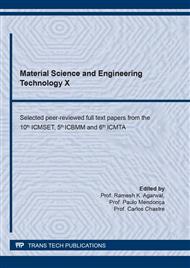[1]
M. L. Wilson and S. H. Kosmatka, Design and Control of Concrete Mixtures, 15th edition. Skokie, Ill: Portland Cement Assn, (2011).
Google Scholar
[2]
K. P. Vishalakshi, V. Revathi, and S. S. Reddy, Effect of type of coarse aggregate on the strength properties and fracture energy of normal and high strength concrete,, Eng. Fract. Mech., vol. 194, p.52–60, (2018).
DOI: 10.1016/j.engfracmech.2018.02.029
Google Scholar
[3]
H. Beshr, A. A. Almusallam, and M. Maslehuddin, Effect of coarse aggregate quality on the mechanical properties of high strength concrete,, Constr. Build. Mater., vol. 17, no. 2, p.97–103, (2003).
DOI: 10.1016/s0950-0618(02)00097-1
Google Scholar
[4]
K.-R. Wu, B. Chen, W. Yao, and D. Zhang, Effect of coarse aggregate type on mechanical properties of high-performance concrete,, Cem. Concr. Res., vol. 31, no. 10, p.1421–1425, (2001).
DOI: 10.1016/s0008-8846(01)00588-9
Google Scholar
[5]
M. F. Kaplan, Flexural and compressive strength of concrete as affected by the properties of coarse aggregates,, in Journal Proceedings, 1959, vol. 55, no. 5, p.1193–1208.
Google Scholar
[6]
F. Yang, H. Li, G. Zhao, P. Guo, and W. Li, Mechanical performance and durability evaluation of sandstone concrete,, Adv. Mater. Sci. Eng., vol. 2020, (2020).
Google Scholar
[7]
L. Butler, J. S. West, and S. L. Tighe, The effect of recycled concrete aggregate properties on the bond strength between RCA concrete and steel reinforcement,, Cem. Concr. Res., vol. 41, no. 10, p.1037–1049, (2011).
DOI: 10.1016/j.cemconres.2011.06.004
Google Scholar
[8]
A. H. D. MARKWICK and F. A. Shergold, THE AGGREGATE CRUSHING TEST FOR EVALUATING THE MECHANICAL STRENGTH OF COARSE AGGREGATES.,, J. Inst. Civ. Eng., vol. 24, no. 6, p.125–133, (1945).
DOI: 10.1680/ijoti.1945.12252
Google Scholar
[9]
GSO 1914/2009 - Portland Cement., GCC STANDARDIZATION ORGANIZATION (GSO), (2009).
Google Scholar
[10]
ASTM C494, Specification for Chemical Admixtures for Concrete,, ASTM International.
Google Scholar
[11]
ASTM c1240, Specification for Silica Fume Used in Cementitious Mixtures,, ASTM International.
Google Scholar
[12]
BS 812-105.1:1989 Testing aggregates. Methods for determination of particle shape Flakiness index.
Google Scholar
[13]
BS 812-105.2 : Testing aggregates,Part 105: Methods for determination of particle shape — Section 105.2 Elongation index of coarse aggregate.
DOI: 10.3403/00216305u
Google Scholar
[14]
BS 812-1 - Testing Aggregates Part 1: Methods for Determination of Particle Size and Shape.
Google Scholar
[15]
ACI PRC-211.1-91: Standard Practice for Selecting Proportions for Normal, Heavyweight, and Mass Concrete (Reapproved 2009).
Google Scholar
[16]
BS 812-112 : Testing aggregates - Part 112: Methods for determination of aggregate impact value (AIV).
Google Scholar
[17]
ASTM C39, Test Method for Compressive Strength of Cylindrical Concrete Specimens,, ASTM International.
Google Scholar


